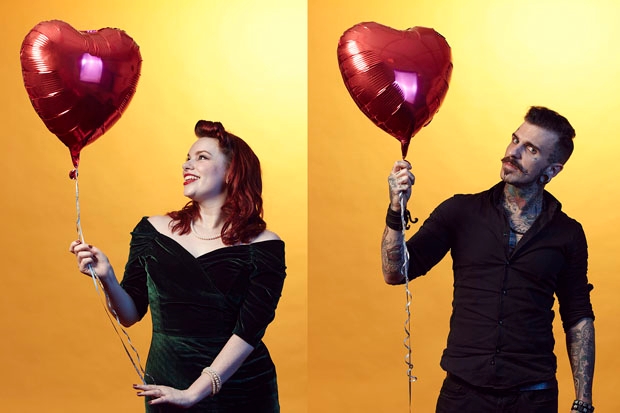Now the kids are back for the school holidays, I have a licence to watch complete trash again. No more brooding Scandi dramas (though Follow the Money is shaping up very nicely — plus, as an added bonus, its anti-windfarm theme is really winding up Guardian readers) — just pure televisual soma, such as the masses use to anaesthetise themselves after another thankless day in their veal-fattening pens.
First Dates (C4, Fridays), for example. You wouldn’t want to pig out on more than one episode at a time but it’s about as perfectly formed a TV experience as you’ll get: you laugh, you cry, you gawp, you cringe; you feel uplifted by the stories with happy endings and reassured by the ones without as you realise — hurrah! — there are lots of people out there who are worse off than you.
It’s a reality TV series — now in its sixth season — in which random couples of varying ages and sexual tastes are filmed experiencing their first dates over dinner at a London restaurant (the Paternoster Chop House). Until the moment they meet they know nothing about one another. But usually they have at least one thing very much in common. What’s fun is waiting for the moment when they discover it.
A few episodes ago, I remember, it was pugs. You could see the joy and relief in the couple’s eyes when — after an age of awkward small talk — they discovered their shared obsession. But that was it. After pugs, pugs, pugs and more pugs they realised they’d run out of chat and that pugs alone aren’t quite enough to sustain a relationship.
Unlike Mr Gay Wagner fan in the episode I watched just now. James, his name was, a handsome, Cambridge-educated lawyer very into his opera and very picky about his men. Then who should walk in but Mark, a nice-looking boy who had confided to us beforehand that he seemed to have a special affinity with Oxbridge graduates and that he was completely obsessed with opera. Really, if they’d ever watched First Dates before, they probably shouldn’t have been that surprised to have been matched up with a fellow opera buff. But they were and it was terribly sweet. Their next date, the end captions informed us, was at the Royal Opera House. Well of course. And I hope they live happily ever after.
My friend Igor — a fellow closet First Dates addict — warned me that I might find it a bit cloyingly PC at times. But I haven’t yet found this to be the case. Yes, there’s probably a greater proportion of gay couples than you’d find in the population at large, but given that they’re often quirkier or more up front than the straight couples this just makes for better entertainment.
What ultimately makes it such compelling viewing, though, aren’t the comedy shock moments (like when the multiply tattooed man reveals that, yes, he does have a bolt through his willy; cue excited twinkle in the eyes of his date, a buxom, cherry-lipped burlesque dancer), but the simple satisfaction of watching compressed, bitesize variants on the boy-meets-girl story.
This satisfies that primal yearning, hard-wired into our system, which Christopher Booker describes in his magisterial The Seven Basic Plots. Telling and repeating stories like this is how we make sense of ourselves and our place in the world. We find these romantic vignettes addictive because we’re programmed that way: before our eyes we witness union emerging from chaos (or not), and when it does we feel the joyous fulfilment of comedic resolution.
Ditto, by the way, The Undateables — another Channel 4 variant on the theme, only this time featuring people with such terrible disabilities or learning difficulties that you fear they’re never going to find true love.
Your natural instinct with this kind of programme — in which Channel 4 specialises (see Embarrassing Bodies, etc) — may be to squirm at the grotesque prurience of it all. And yes, I suppose, at times there is a freak show element — as when, on Employable Me (BBC2) we saw a man with Tourette’s try to find a job in the fishing industry. (‘Wanky taxi driver’, he addressed the cabby; ‘fishy fanny’, he said to the fisherman. Then ‘Hey Dolphin!’ when he didn’t get the job.)
But the real appeal is much more noble than that. Even on programmes like the shocker of a documentary I watched with Boy the other week on one of the cable channels called Dan’s 80lb Testicle in which a man called Dan sought to have — no, really — his 80lb testicle surgically removed. It’s about the simple honest pleasure of watching your fellow humans overcome difficulty and find happiness. Not freakish, then. Just nice.






Comments